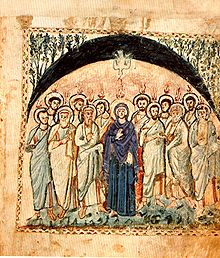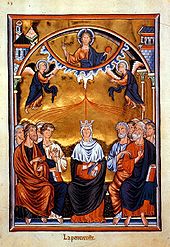Pentecost
![]()
This article is about the Christian festival. For other meanings, see Pentecost (disambiguation).
Pentecost (from Greek πεντηκοστὴ ἡμέρα pentēkostē hēméra, German 'fiftieth day') is a Christian festival. The term in German was originally a dative plural "at the Pentecosts", then nominative plural "the Pentecosts", finally nominative singular "the Pentecost." The feast content is the sending of God's Spirit to Jesus' disciples and His abiding presence in the Church. Iconographically, Pentecost is also called the sending of the Holy Spirit or the outpouring of the Holy Spirit. Pentecost Sunday is the 50th day of the Easter season, 49 days after Easter Sunday, and falls between May 10 (earliest date) and June 13 (latest date).
In the New Testament, the Acts of the Apostles tells us that the Holy Spirit descended upon the apostles and disciples as they were gathered in Jerusalem for the Jewish feast of Shavuot (τὴν ἡμέραν τῆς πεντηκοστῆς 'the 50th day') (Acts 2:1-41 EU). This date is also understood in Christian tradition as the foundation of the church.

Outpouring of the Holy Spirit in the Rabbula Gospels (586)
Jewish background
The Jewish Feast of Weeks (Hebrew Shavuot) is one of the three pilgrim festivals. Much of ancient Judaism was Greek-speaking; here the feast had the name ancient Greek ἡ πεντηκοστή hē pentekostḗ "the fiftieth". This refers to the 50th day after the Feast of Unleavened Bread (Feast of Mazzoth). It is a harvest festival, as it marks the completion of the wheat harvest beginning with Passover. The Feast of Weeks also commemorated the giving of the Torah to Moses on Mount Sinai. The event of Pentecost is told in Acts in such a way that linguistic references are made to this legislation at Sinai.
Pentecost in the New Testament
The feast of pentekostḗ is mentioned three times in the New Testament. Apart from Acts ch. 2 the Jewish feast of weeks is twice a date in Paul's travel plans: In Ephesus he wants to stay until pentekostḗ (1 Cor 16,8 EU), if possible arrive at pentekostḗ in Jerusalem (Acts 20,16 EU).
The 2nd chapter of Acts is of great importance in the conception of the historical work of Luke: In the first part, the Gospel of Luke, the public activity of Jesus of Nazareth begins with the Holy Spirit descending on him "visibly in the form of a dove" (Lk 3:22 EU). The second part, the Acts of the Apostles, opens accordingly with the Holy Spirit also descending upon the apostles in a way that is perceptible to the senses. The risen Lord had already prepared them for this (Acts 1,4-5 EU, Acts 1,8 EU).
In the beginning, according to Alfons Weiser, there are special glossolalia experiences in the early Christian community in Jerusalem. They were told in a way that echoed the theophany motifs of the Sinai tradition. The early Christian interpretation of Ps 68:19 EU can be seen in Eph 4:7-8 EU. According to this, it is the exalted Christ who gives the disciples the gifts of the Holy Spirit, including precisely the glossolalia (speaking in tongues). Luke took these oral narratives and stylized them. A major intervention was the transformation of the glossolalia tradition into a foreign language miracle, showing knowledge of a list of peoples in ancient geography. Thus emerges an account, singular in the entire New Testament, of the Holy Spirit descending on the apostles at a specific date and place with extraordinary accompaniments, and the effect, the foreign language miracle, being witnessed by people from different lands:
- The gathered disciples are filled with the Holy Spirit:
"When the day of Pentecost had come, they were all together in the same place. Then suddenly there came from heaven a roaring as of a violent tempest, and it filled the whole house where they were sitting. And there appeared unto them tongues as of fire, which were scattered abroad; upon each of them one settled. And they were all filled with the Holy Ghost, and began to speak in other tongues, as the Spirit inspired them."
- Acts 2:1-4 EU
- Members of numerous non-Jewish peoples ("Parthians, Medes and Elamites, inhabitants of Mesopotamia, Judea and Cappadocia, of Pontus and the province of Asia, of Phrygia and Pamphylia, of Egypt and the region of Libya towards Cyrene, also the Romans, [...] Cretans and Arabs") are surprised that they each hear his mother tongue, although the disciples are Galileans; Acts 2:7-11 EU. This seemingly arbitrary list of nations is based on original Babylonian astrological geography, which traditionally assigned a sign of the zodiac to each country.
- In a sermon of the apostle Peter the event of Pentecost is interpreted and placed in the context of the history of salvation.
· Peter refers to a promise of God through the prophet Joel that God would pour out his Spirit on all flesh in the last days (cf. Joel 3:1-5 EU):
"Then Peter stood up, together with the eleven; he lifted up his voice and began to speak: 'You Jews and all the inhabitants of Jerusalem! This ye shall know, heed my words! These men are not drunk, as you suppose; for it is only the third hour of the day; but now is coming to pass what was spoken through the prophet Joel: In the last days it shall come to pass, thus saith God, I will pour out of my Spirit upon all flesh. Your sons and your daughters shall speak prophetically, your young men shall have visions, and your old men shall dream dreams. Also upon my servants and upon my handmaids I will pour out of my Spirit in those days, and they shall speak prophetically."
- Acts 2:14-18 EU
· After the resurrection of Jesus Christ, the sending of the Spirit proved that Jesus was exalted to Lord and Christ by God's action:
"God raised this Jesus from the dead, as we are all witnesses. Exalted to the right hand of God, he received from the Father the promised Holy Spirit, and poured him out, as you see and hear. [...] Know ye therefore with certainty all the house of Israel, that God hath made him Lord and Christ, this Jesus, whom ye have crucified."
- Acts 2:32-36 EU
· When asked by the audience, Peter mentions repentance and baptism as the way to receive the promised Holy Spirit. On the day of Pentecost three thousand people followed this:
"When they heard this, it struck them to the heart, and they said to Peter and the rest of the apostles: What shall we do, brethren? Peter answered them: Repent, and be baptized every one of you in the name of Jesus Christ for the remission of your sins; and ye shall receive the gift of the Holy Ghost. For to you and to your children is the promise, and to all those afar off whom the Lord our God will call. And with many other words he bade and exhorted them, saying, Be ye saved out of this corrupt generation. Now those who accepted his word were baptized. That day about three thousand people were added to their fellowship. They held fast to the apostles' doctrine, and to fellowship, and to the breaking of bread, and to prayers."
- Acts 2:37-42 EU
For the descent of the Holy Spirit the Acts of the Apostles chooses the metaphor "tongues as of fire" that descended on those present (Acts 2:3 EU). The presence of the Holy Spirit, on the other hand, is expressed by the four Gospels at the baptism of Jesus with "in the form of a dove" that descended on Jesus (Mk 1:10 EU).
The "miracle of Pentecost" is the term used to describe the xenoglossia described in the Acts of the Apostles (Acts 2:4-13 EU), that is, the miraculous occurrence of the people gathered for the feast hearing the apostles each speak in their own language.
In the account of John's Gospel (John 20:19-23 EU), on the evening of Easter Day, the Risen Lord came into the midst of his disciples, breathed on them, and with the words, "Receive ye the Holy Ghost!" imparted to them the Spirit of God.

Representation of Pentecoste (Old French for Pentecost) in the Ingeborg Psalter (around 1200)
Questions and Answers
Q: What does the word "Pentecost" mean?
A: "Pentecost" means "the 50th day" in Greek.
Q: What is Pentecost also known as in the United Kingdom and other English-speaking areas?
A: Pentecost is also known as Whitsun, Whitsunday, or Whit Sunday in the United Kingdom and other English-speaking areas.
Q: When does Pentecost occur in the Christian liturgical year?
A: Pentecost occurs 50 days after Easter and 10 days after Ascension Thursday in the Christian liturgical year.
Q: What is the significance of Pentecost to Christians?
A: Pentecost remembers the coming of the Holy Spirit to the Apostles and other followers of Jesus as described in the book of Acts in the Bible, which Jesus had promised after he rose from the dead. About 3,000 people were baptized that day, which to many, making it the real start of the Christian Church.
Q: How many people were baptized on the day of Pentecost?
A: About 3,000 people were baptized on the day of Pentecost.
Q: When is the Day of Pentecost for 2019?
A: The Day of Pentecost for 2019 is June 9 (Western)/June 16 (Eastern).
Q: What book in the Bible describes the coming of the Holy Spirit on Pentecost?
A: The book of Acts in the Bible describes the coming of the Holy Spirit on Pentecost.
Search within the encyclopedia